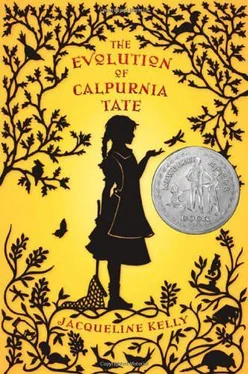Jacqueline Kelly - The Evolution of Calpurnia Tate
Здесь есть возможность читать онлайн «Jacqueline Kelly - The Evolution of Calpurnia Tate» весь текст электронной книги совершенно бесплатно (целиком полную версию без сокращений). В некоторых случаях можно слушать аудио, скачать через торрент в формате fb2 и присутствует краткое содержание. Город: New York, Год выпуска: 2009, ISBN: 2009, Издательство: Macmillan : Henry Holt and Company, Жанр: Детская проза, на английском языке. Описание произведения, (предисловие) а так же отзывы посетителей доступны на портале библиотеки ЛибКат.
- Название:The Evolution of Calpurnia Tate
- Автор:
- Издательство:Macmillan : Henry Holt and Company
- Жанр:
- Год:2009
- Город:New York
- ISBN:978-0-8050-8841-0
- Рейтинг книги:5 / 5. Голосов: 1
-
Избранное:Добавить в избранное
- Отзывы:
-
Ваша оценка:
- 100
- 1
- 2
- 3
- 4
- 5
The Evolution of Calpurnia Tate: краткое содержание, описание и аннотация
Предлагаем к чтению аннотацию, описание, краткое содержание или предисловие (зависит от того, что написал сам автор книги «The Evolution of Calpurnia Tate»). Если вы не нашли необходимую информацию о книге — напишите в комментариях, мы постараемся отыскать её.
The Evolution of Calpurnia Tate — читать онлайн бесплатно полную книгу (весь текст) целиком
Ниже представлен текст книги, разбитый по страницам. Система сохранения места последней прочитанной страницы, позволяет с удобством читать онлайн бесплатно книгу «The Evolution of Calpurnia Tate», без необходимости каждый раз заново искать на чём Вы остановились. Поставьте закладку, и сможете в любой момент перейти на страницу, на которой закончили чтение.
Интервал:
Закладка:
“Who collected it?”
“We are speaking of Mr. Darwin.”
“We are?” I couldn’t believe it. “He sent you that?”
“Indeed. Over his lifetime he carried on an extensive correspondence with many naturalists around the world and traded specimens with quite a few of us.”
“Granddaddy you’re kidding.”
“Calpurnia, I would never ’kid.’ And, for once, your mother and I are in agreement on this important point: The use of slang is an indicator of a weak intellect and an impoverished vocabulary.”
I couldn’t believe it. We had not just his book in our house, but a monster collected by Mr. Darwin himself. I stared at the thing and tried to make sense of its too many arms and legs.
“What is it?”
“What do you think it is?”
I made a face of exasperation. “You sound like Mother telling me to look up a word in the dictionary when I don’t know how to spell it.”
“Good. Another point of agreement.”
I edged up to the jar and tried to read the small paper tag hanging from a string around the neck of the bottle. The writing was old-fashioned and faded. I couldn’t read it, but it was a thrill just to know that Mr. Darwin had written it with his own pen in his own hand.
“Can I take it out of the jar? It’s hard to see, what with it being all squashed in there.”
“It is almost seventy years old and preserved in spirits of wine. I am afraid it will disintegrate if we remove it.”
I peered at it. Land? Sea? Or Air? Although there were many limbs, they looked rubbery and not substantial enough to bear any weight, so it had to be a swimmer. Sea, then. Except that there were no fins. How could it swim without fins? Hmm, a problem. And I couldn’t see any gills. Another problem. The eyes were oversized saucers. Why would they need to be so big? Answer: to see in the dark, of course. It had to live in areas of low light, which meant deep water.
I said, “It is some kind offish, and it lives near the bottom of the ocean. But it’s unlike any other kind offish I have ever seen. I don’t see how it locomotes, or how it breathes.”
“As far as you go, you are correct. It is unfair to expect you to surmise more, because it is, as you say, squashed in there. It is a cuttlefish. The family is Sepiida, the genus is Sepia. It locomotes by pulling water into a cavity in the mantle and squeezing it through a muscular siphon. The mantle also hides the gills. When startled by a predator, it releases a cloud of brownish black ink to obscure its escape. We use the calcified internal shell as an abrasive. Owners of captive birds sometimes give them the shell on which to sharpen their beaks.”
The thing fascinated me. It was a piece of history as well as an oddity. I touched a finger to the cool glass.
I LATER MENTIONED to Harry how interesting I found the bottled beast. Startled, he looked up from the book he was reading and said, “You’ve been in the library?”
“Yes,” I said, and added, “Granddaddy invited me.”
“Oh, well, in that case. Did you notice the ship in a bottle? I think that’s the most interesting thing, although I haven’t had a chance to get a good look at all his things. He got it from the Volunteer Fire Department years ago when he gave them money and bought the pump wagon. I’m hoping he’ll leave it to me in his will.” He looked at me curiously. “You seem to be spending a lot of time with him.”
“Sometimes.”
“What do you and that old man talk about?”
This made me wary. Harry didn’t so much worry me, but what if the younger brothers discovered that Granddaddy was a trove of weird and fascinating facts about Indian fighting, the larger carnivores, hot-air ballooning? I’d never have him to myself again.
“Um, things,” I said and flushed. I hated withholding anything from Harry. He turned back to his book, and I kissed his cheek. He stroked my hair absently. “You’re still my own pet, right?”
“That’s right,” I declared. “I am.”
It didn’t occur to me that others in my family also noticed I spent time with Granddaddy until Jim Bowie said, “How come you play with Granddaddy more than you play with me, Callie?”
“That’s not true, J.B. I play with you lots. And besides, Granddaddy and I aren’t playing. We’re doing Science,” I said, realizing as I spoke how pompous I sounded.
“What’s that?”
“It’s when you study the world around you and you try to figure out how it works.”
“Can I do it too?”
“Maybe you can when you get to be my age.”
J.B. thought about this and then said, “I don’t want to. He’s scary, Callie. He hardly ever smiles. And he smells real funny.”
It was true. Granddaddy smelled like wool, tobacco, mothballs, and peppermint. And sometimes whiskey.
J.B. went on, “He’s not very jolly. My friend Freddy has a jolly grampa. And where’s our other grampa? Don’t we get two? Freddy has two, so how come we don’t have two?”
“The other one died before you came along. He caught typhus and then he died.”
“Oh.” He thought about this. “Can we get another one?”
“No, J.B. First he was Mother’s father, and then later he caught typhus and died.” J.B. looked perplexed by the idea that his own mother had once been a child herself.
“Why can’t we get another one?”
“It’s hard to explain, J.B. One day you’ll understand,” I said.
“Okay.” Whenever I told him this, instead of becoming infuriated like Sul Ross, he always accepted it on faith. He put his arms up for a kiss.
“Who’s your favorite sister?” I said.
“You are, Callie Vee.” He giggled.
“Oh, J.B.,” I breathed into his silky hair, overcome by his sweetness.
“What?”
“Nothing. I’ll play with you more often, okay?” I did mean it when I said it.
“’Kay.”
But I had so much work to do following that singular day when, floating in the river and looking at the sky, I’d been struck by a thunderbolt of understanding about grasshoppers and—really—the world itself. By the time I’d clambered up the riverbank, I had been transformed into an explorer, and the first thing I’d discovered was another member of my own odd species living at the other end of the hall. There was a living treasure under our roof, and none of my brothers could see him.
“ARE YOU COMING, Calpurnia?” Granddaddy called.
“Yessir, coming!” I galloped down the hall into the library with a fishing creel over my shoulder. It was an old wicker one of Granddaddy’s with hardly any fishy smell left. It was full of my Notebook, collecting jars, a cheese sandwich, a corked bottle of lemonade, and a waxed paper twist of pecans.
“I thought we’d use the microscope today,” he said, securing it in its case and nestling it in his haversack. “It’s an old one, but the lenses are nicely ground, and it’s still in good condition. I expect you have newer ones at school.”
A microscope was a rare and valuable thing. We had no microscopes at school. I was willing to bet I was looking at the only one between Austin and San Antonio.
“We don’t have any at school, Granddaddy.”
This gave him pause. “Is that so? I don’t understand the modern educational system at all.”
“Neither do I. We have to learn sewing and knitting and smocking. In Deportment, they make us walk around the room with a book on our heads.”
Granddaddy said, “I find that actually reading the book is a much more effective way of absorbing it.” I laughed. I’d have to tell Lula that one.
“What are we going to study today?” I asked.
“Let us examine pond water for algae. Van Leeuwenhoek was the first man to have seen what you will see today. He was a wool merchant, much as I was a cotton merchant.” He smiled. “So, you see, there is something to be said for the inspired amateur. What he saw was unimaginable. Ahh, I remember well my first look. It was like falling through the lens into another world. Do you have your Notebook? There will be much to record.”
Читать дальшеИнтервал:
Закладка:
Похожие книги на «The Evolution of Calpurnia Tate»
Представляем Вашему вниманию похожие книги на «The Evolution of Calpurnia Tate» списком для выбора. Мы отобрали схожую по названию и смыслу литературу в надежде предоставить читателям больше вариантов отыскать новые, интересные, ещё непрочитанные произведения.
Обсуждение, отзывы о книге «The Evolution of Calpurnia Tate» и просто собственные мнения читателей. Оставьте ваши комментарии, напишите, что Вы думаете о произведении, его смысле или главных героях. Укажите что конкретно понравилось, а что нет, и почему Вы так считаете.












